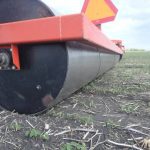Workers at two CNH Industrial manufacturing plants in the U.S. Midwest have hit the picket line after their previous contract expired without an agreed-upon replacement.
United Auto Workers, whose locals 180 and 807 represent over 1,000 employees at CNH’s plants at Racine, Wisconsin and Burlington, Iowa respectively, said Monday the workers went on strike that day “after the company failed to present an agreement that met member demands and needs.”
UAW said previously that it had begun negotiating a new contract in early April ahead of the previous collective bargaining agreement’s expiry last Saturday.
Read Also

Wheat breeding system no longer works, Canadian Wheat Research Coalition report says
A Canadian Wheat Research Coalition report, published Feb. 26, says the status quo is not an option for Canada’s wheat breeding system. It must be transformed, by farmers.
The Burlington plant makes harvest headers for Case IH and New Holland combines as well as backhoes, forklifts and crawler dozers.
The Racine plant, meanwhile, makes Case IH Magnum tractors, as well as transmissions for the company’s Axial-Flow combines and axles and valves for other “agricultural applications.”
The affected workers are on strike “for the ability to earn a decent living, retire with dignity and establish fair work rules,” said Chuck Browning, director of UAW’s agricultural implement department, said in a release Monday.
The union, he added, is also “committed to bargaining until our members’ goals are achieved.”
Reuters on Monday quoted a CNH spokesperson as saying the company “will continue to negotiate in good faith and trust that the union will do the same.”
UAW president Ray Curry, in Monday’s release, said the two plants’ members “have worked through the pandemic after the company deemed them essential, to produce the equipment that feeds America, builds America and powers the American economy” and their strike “can make a difference for working families here and throughout the country.” — Glacier FarmMedia Network














